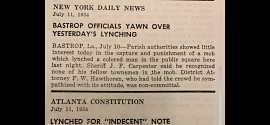 Donald Trump’s repugnant comparison last fall of the then Congressional impeachment inquiry to a “lynching” sparked wide rebuke of this President whose racial insensitivities frequently flare into outright racism.
Donald Trump’s repugnant comparison last fall of the then Congressional impeachment inquiry to a “lynching” sparked wide rebuke of this President whose racial insensitivities frequently flare into outright racism.
The legal impeachment process laid out in the U.S. Constitution stands in sharp contrast to the illegal mob murders of lynching, the gruesome violence that snuffed thousands of lives – predominately blacks – across America from the late 1800’s to the early 1960’s.
However, Trump’s claim about lynching holds validity when considering actions and inactions by Republicans on Capitol Hill during the impeachment proceedings of this President with his pronounced disdain for legal process.
But this accuracy in Trump’s lynching assertion is far different from the intent of that initial impeachment-lynch comparison from the President who proudly self-identifies as a ‘nationalist’ largely to stoke support of bigots in his base.
Lynching comprised an extraordinarily bloody chapter of American history that does not have the societal understandings it merits.
Too few understand how the damning dynamics of lynching extended beyond vigilante violence. Those ‘public spectacles’ sometimes drew mobs numbering in the thousands to witness hangings and burnings of lynch targets whose body parts were often severed for souvenirs.
Compounding the heinous crime of the actual lynching in public places or isolated spaces was the routine defiant refusal of law enforcers – police, prosecutors, judges and juries – to hold mob murders accountable.
A news report on a July 1934 lynching in Louisiana stated authorities “showed little interest…in the capture and punishment” lynch mob members.
That blatant refusal to enforce the law in an obvious crime where the criminals were identifiable by eyewitnesses and other evidence was the rule not the exception with lynching’s.
Following a 1959 lynching in Mississippi, FBI agents obtained confessions from the perpetrators. But that town’s judge and prosecutor refused to give the FBI’s evidence to a grand jury that then cited lack of evidence when declining to issue indictments.
Straight-faced authorities –- police, prosecutors and judges –- routinely bent and broke laws to permit murders to evade accountability for their crimes.
During a 1948 trial in Georgia for two men charged with murdering a black funeral supply salesman two jurors testified as character witnesses for the defendants and the trial judge ruled that perverted process legal.
This lynch dynamic of willful blindness by authorities to obvious evidence of criminal conduct that occurred in public is an element infused into the staunch GOP Capitol Hill opposition to the impeachment of Trump.
Senate Republicans blocked a Democratic attempt to have testimony from witnesses in the impeachment trial despite the emergence of new evidence of Trump’s misconduct since the impeachment proceeding in the House and the fact that all previous presidential impeachment proceedings in the Senate included testimony from witnesses.
The contortions of Republican Senators cavalierly ignoring disturbing evidence of misconduct by Trump from his professed “perfect” telephone call with the President of Ukraine soliciting interference in a U.S. election in violation of federal law through Trump’s cover-up that obstructed the Congressional impeachment evidences dynamics evident in white-washing lynching’s.
South Carolina Senator Lindsey Graham is a prime example of Republican contortion on impeachment.
Graham, like other Trump defenders, argued that because the House impeachment articles do not contain specific criminal charges impeachment is improper. This stance ignores law.
Purposely obscured in this stance is the fact that Trump escaped indictment for obstruction of justice in the Mueller probe due simply to a non-court sanctioned U.S. Justice Department opinion that bars bringing criminal charges against a sitting president.
Further, Graham’s posture that Trump’s misconduct does not rise to the level of impeachable ‘high crimes & misdemeanor’ offenses referenced in the Constitution contradicts Graham’s own stance on impeachable offenses when then Congressman Graham served as a Republican Congressional manager during the 1999 Senate impeachment trial of former President Bill Clinton.
During the Clinton impeachment Graham declared impeachable misconduct “Doesn’t even have to be a crime. It’s just when you start using your office and you’re acting in a way that hurts people, you’ve committed a high crime.”
The backing of Graham and his fellow Republican Senators of the no-witnesses stance stressed by Trump’s impeachment lawyers shares the strategy of the defense lawyer in a 1947 lynching trial in Greenville, South Carolina. That defense lawyer called no witnesses for the 31 defendants to counter the fact that FBI agents had obtained confessions from 26 of the defendants. An all-white/all-male jury acquitted all of the defendants.
Trump framed his original lynch comparison with charges of being subjected to a denial of due process. That was a dubious proposition from a man who advocated denial of due process for the Central Park 5 – teens falsely convicted for a vicious assault in New York City that sparked what many described as a lynch mob-like atmosphere.
